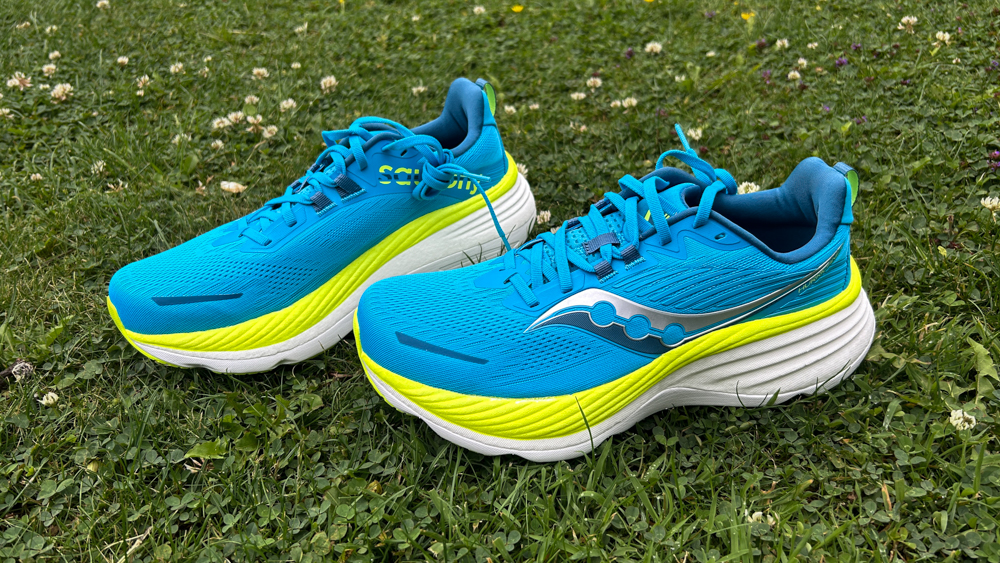
The Saucony Hurricane 24 is an exceptionally comfortable running shoe and a big update on its predecessor, boasting a higher-stack, a new rocker and improved midsole foams.
The stability and comfort it delivers make it one of the best running shoes available for easy and long runs, even if the Hurricane 24 is not as well-suited to fast runs as other shoes because of its weight.
My Tom’s Guide colleague Jessica Downey and I have both been racking up the miles for our Saucony Hurricane 24 review and we are both impressed by the upgrades Saucony has made to the shoe.
Saucony Hurricane 24 review: price and availability
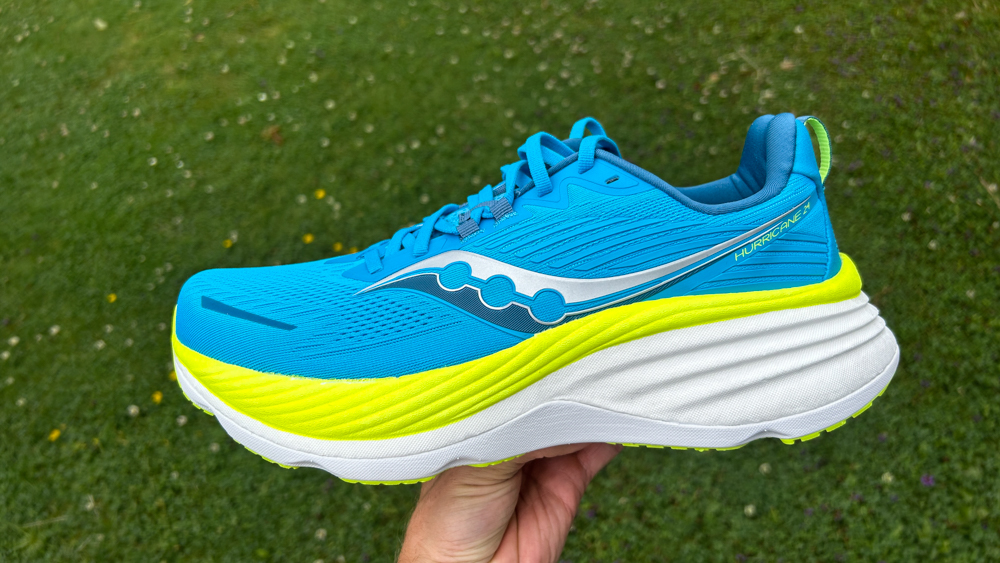
The Saucony Hurricane 24 launched in July 2024 and costs $160 in the US, and £165 in the UK. That’s the same price in the US as the Hurricane 23, which came out over three years ago, and in line with other premium cushioned stability shoes like the Asics Gel-Kayano 31 and the Saucony Triumph 22, which is Saucony’s top cushioned shoe for neutral runners.
Saucony Hurricane 24 review: design
The Saucony Hurricane 24 is a stability shoe designed to provide extra support for runners who overpronate in particular, but still comfortable for neutral runners as well. It is currently available in seven colors — I tested the Viziblue/Citron shoe, while Jess tested the White/Foam shoe.
It has a high stack height of 38mm at the heel and 32mm at the forefoot for a 6mm drop, and a very wide base to create stability. That height and width make it quite a heavy shoe — my US size 10 weighs 11.5oz, which makes it one of the heavier shoes I’ve tested this year.
Upper
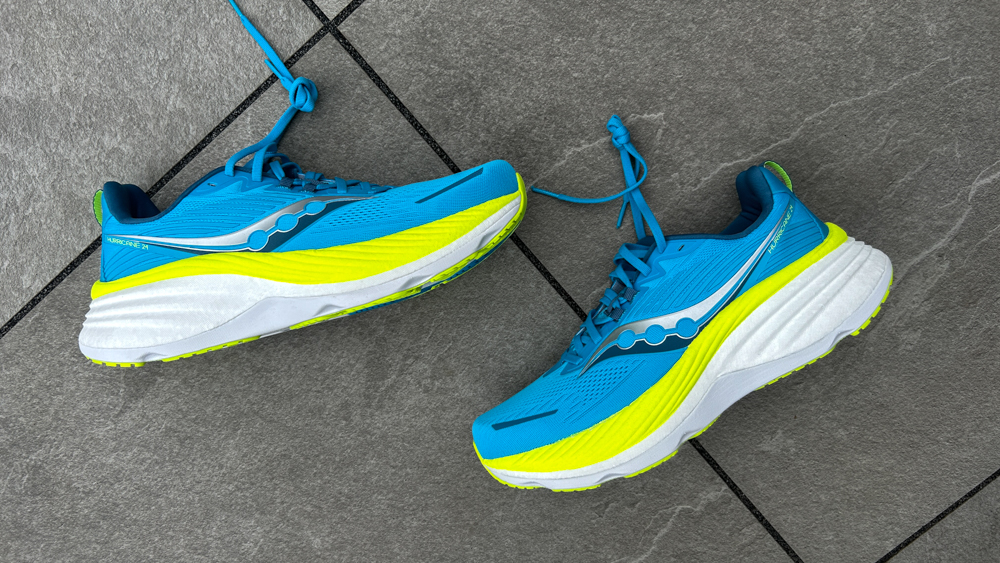
The Saucony Hurricane 24 has a mesh upper with padding around the collar and on the tongue to give a plush feel to the shoe, and the step-in comfort is accentuated by internal fabric treatments that make the upper feel softer.
There is an internal heel counter to create some extra support at the back of the shoe, but the upper is still quite flexible around the heel. The heel tab rises quite high along the Achilles, which initially concerned me as some shoes irritate my Achilles tendon, but this issue did not arise with the Hurricane 24.
Midsole
The Hurricane 24 has a dual-density midsole, with the bulk of it being made from Saucony’s bouncy Peba-based PWRRUN PB foam, along with a frame made from standard PWRRUN, which is a firmer material that is used to create stability.
Support and stability is also provided by the sidewalls of foam that cradle the foot on the run, and the broad base of the shoe. The Hurricane 24 also has a rocker that is designed to keep your foot in a neutral position as you transition from heel to toe, rather than rolling too far inwards.
Outsole
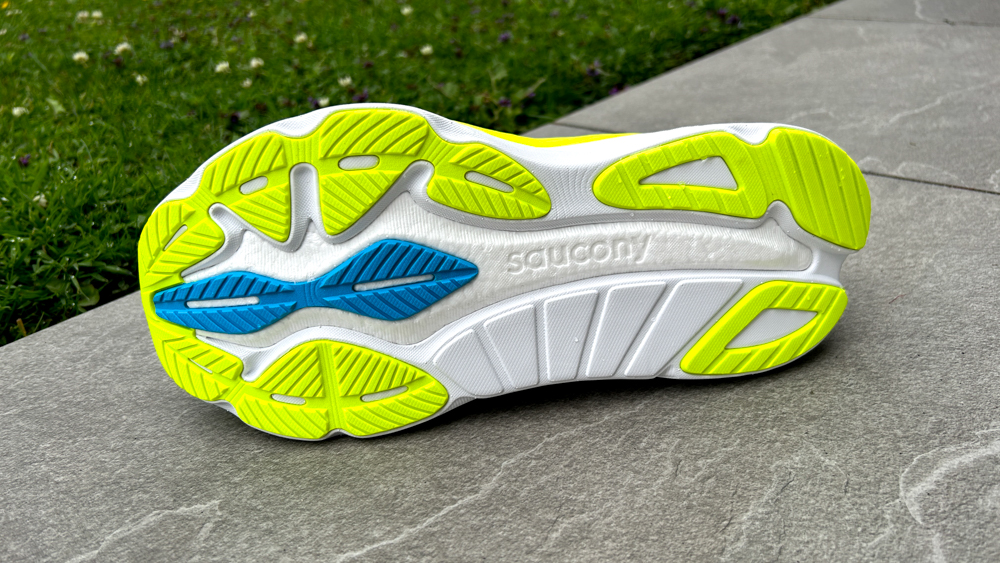
There is a lot of exposed foam on the outsole of the Hurricane 24, but rubber does cover the key impact areas at the forefoot and heel. I’ve not seen any signs of wear and tear on the exposed foam so far and the shoe has gripped well for me on light trails as well as wet pavements.
Saucony Hurricane 24 review: how's the fit?
The Saucony Hurricane 24 is available in both regular and wide fits and the sizes available at 7-16 for men and 5-12 for women.
NHF: I had no problems with the fit in my normal running shoe size, with enough room in the toe box and a secure hold around the midfoot and at the heel. There is a lot of padding around the collar and tongue but this wasn’t oppressive on hot runs and didn’t rub for me.
JD: Initially, I noticed that the toe box felt slightly less roomy than what I'm used to wearing my usual size in Saucony running shoes. However, it wasn’t tight enough to cause discomfort during testing or to warrant shifting up a size.
If you have wider feet or are between shoe sizes and are considering this Saucony model, I’d recommend visiting a store to try on different sizes and both the regular and wide-fit options to find the best fit for you.
Saucony Hurricane 24 review: running performance
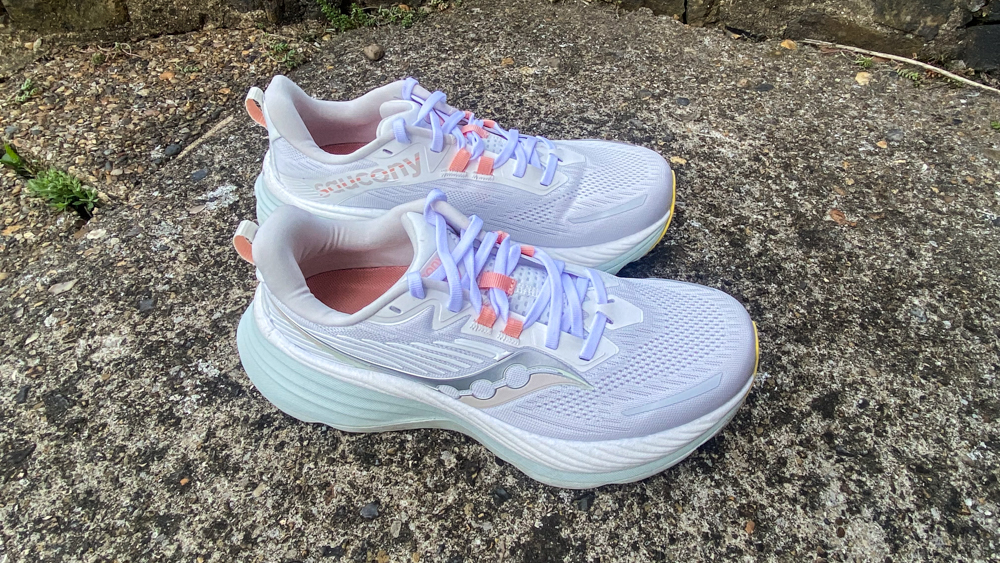
JD: I really enjoyed testing the Saucony Hurricane 24 and will continue to run in this shoe regularly. As soon as I had an initial test walk around my apartment in the shoe I could feel a glorious layer of cushioning underfoot and was eager to test out how this would perform on the roads.
My first run in the shoe was high tempo, which isn’t the type of run I’d say this shoe excels in as it is on the heavier side and my legs could certainly feel this as I tried to keep my pace nice and snappy.
Although I didn’t necessarily feel super speedy in the Hurricane 24, I did appreciate how stable I felt while running in the shoe. Thanks to the wide base, high sidewalls and the outer layer of PWRRUN foam in the midsole this shoe offers both structure and support.
Where this running shoe really excelled was during my easy and longer runs. I wore them during an eight-mile run with my run club which was done at a very light and fluffy conversational pace and from start to finish I felt extremely comfortable in the shoe.
The PWRRUN PB midsole layer of foam felt soft and bouncy from start to finish. I also liked the slight rocker within the shoe that made my transitions feel smoother as I got a good roll from heel to toe.
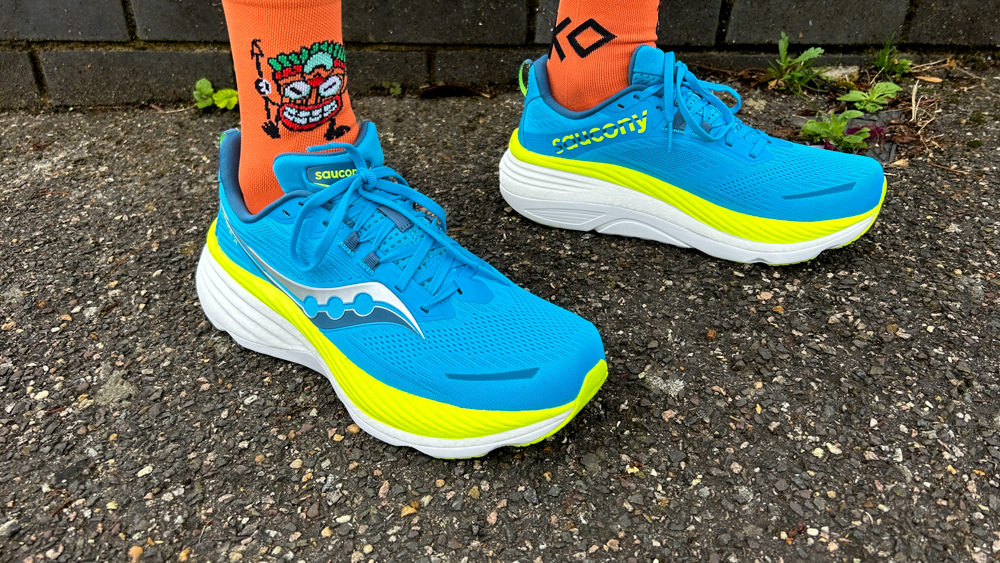
NHF: The Saucony Hurricane 24 is not the kind of running shoe I usually go for. I am a neutral runner and tend to prefer lighter shoes with less cushioning even for easy runs. However, I was won over by the Hurricane 24, because it is so comfortable, and the rocker delivers a very smooth and supportive ride for relaxed runs.
The PWRRUN PB in the midsole has a softer feel to me than the same foam when used in other shoes, like the Triumph 22, but still rebounds well so you’re not sinking too far into the foam with each stride.
The support from the PWRRUN frame and the wide base of the shoe means that the Hurricane 24 feels very stable despite the high stack, and I found it perfect for doing my Sunday long run on tired legs during higher mileage weeks.
I would only use the shoe for easy and long runs myself though, because it is a bit too big and heavy to feel well-suited when running at speed. I did do some faster running in the shoe, and it could serve well as an all-rounder for newer runners or those focused mainly on comfort over speed, but ideally I would pair it with a lighter, faster shoe for speedwork, like Saucony’s own Tempus.
While the Hurricane 24 is a stability shoe, it’s one that is certainly comfortable for neutral runners to use as well, and follows the trend of providing support through subtle features like a wide base and sidewalls of foam rather than traditional elements of stability shoes like medial posts.
Should you buy the Saucony Hurricane 24?
JD: If you’re an overpronator or you just enjoy a more stable running shoe, then the Saucony Hurricane 24 is worth considering. This shoe provides extreme comfort and a good level of bounce all the while making sure you feel nice and stable as you run.
It is a big shoe and, as a result, it is on the heavier end, so while you won’t feel super fast wearing the Hurricane 24, they are a safe and fun option for any running outside of speed and tempo work.
It’s a great option for beginners looking for a cushioned daily trainer, or runners who are less focused on breaking personal records but want a reliable, durable shoe to keep them comfortable and safe on their slower-paced or bigger mileage runs.
For those seeking a lighter, more agile option for faster runs or speedwork, you should take a look at the Saucony Guide 17. Or if you are looking for a neutral running shoe with a sprinkle of stability features like integrated sidewalls and a broad base, the On Cloudmonster may suit you better.
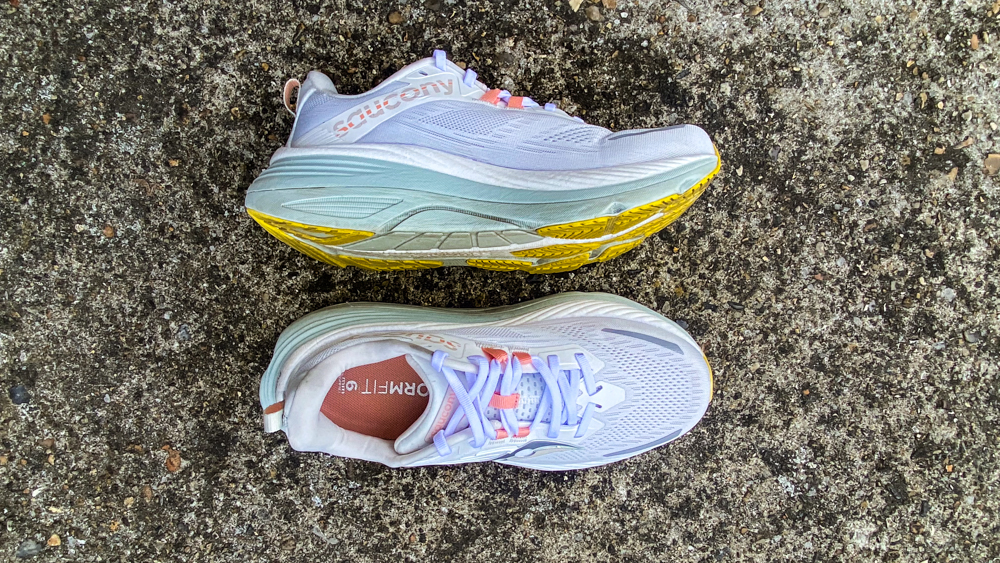
NHF: If you’re looking for a comfortable ride, the Saucony Hurricane 24 is a standout option regardless of whether you normally use a stability shoe or not. It’s the most comfortable shoe I’ve tested this year, and one I’ll keep around my own rotation to use for easy long runs in particular.
I found it a better shoe than the Saucony Triumph 22, which doesn’t feel as soft and smooth, and I also preferred it to the Asics Gel-Kayano 31, another cushioned stability shoe, because the rocker on the Hurricane 24 is more noticeable and enjoyable.
If you’re looking for a lighter and more versatile stability option then the Saucony Tempus also uses a dual-density midsole with a core of PWRRUN PB, and would fit the bill. Another good option is the Hoka Skyward X, which is a bit bouncier than the Hurricane 24 and has more versatility while still being pretty stable, though the Skyward X is considerably more expensive.







